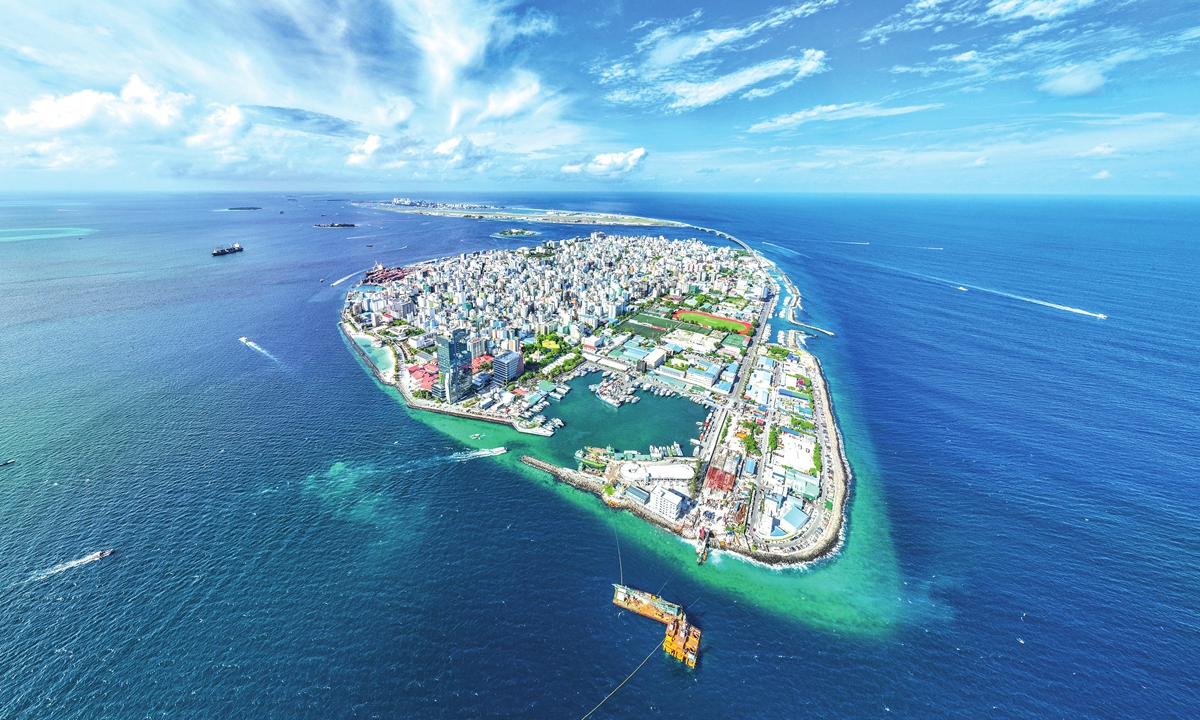
Aerial photo of Maldives' capital city Male Photo: Courtesy of CCCC
As the Belt and Road Initiative (BRI) construction has brought tangible benefits to the people of Maldives, the Chinese business community on the island nation and Chinese experts said that the next decade will see more fruitful cooperation results, thanks to elevated ties between the two countries.
China and Maldives elevated bilateral ties to a comprehensive strategic cooperative partnership on Wednesday during the visit of President of the Republic of Maldives Mohamed Muizzu.
The two countries signed cooperation documents on the advance of the high-quality construction of the BRI, on economic growth and disaster prevention, on green technology, infrastructure, people's livelihoods, marine development and digitalization.
Great cooperation
China and Maldives will expand cooperation on marine ecological and environmental protection, as well as strengthen people-to-people exchanges.
Chinese experts said that the two countries, having established friendly relations during the past Maritime Silk Road partnership and having undertaken very productive BRI cooperation in recent years, stand to scale new heights in a wide range of fields, including infrastructure, agriculture and more.
In the past few years, infrastructure has been at the forefront of the joint construction of the BRI between China and Maldives.
The Maldives-China Friendship Bridge, a dream project to local residents over half a century, has become a symbol for the friendliness between the two countries, which has changed the daily lives of Maldivians.
Many Western companies had reportedly studied the project for years, but construction never started due to technological and funding difficulties, but Chinese firms eventually completed the project, leveraging a number of technological breakthroughs and low interests loans.
"In the past five years, the bridge has carried over 100 million passenger visits, promoting the flow of personnel and materials between the isles," a manager with Chinese infrastructure giant CCCC told the Global Times on Thursday.
A pizza shop on the Male Island launched a cross-island takeaway service. Delivery boys ride across the bridge to deliver fresh pizza. Crossing the bridges takes just 10 minutes. Before, it was hours of waiting for a shuttle ferry.
"In addition to rising convenience, the bridge has made living in the isles better. Now traffic lights have been erected on the Male Island, and the project helped create jobs for locals," the manager said. "New bus services were opened along with the bridge and nowadays the number of bus lines passing over the bridge has grown to five, and the number of buses in Maldives has increased to 17 from nine in 2018."
Further cooperation with China, which will make the Maldivian economy more diversified and resilient, represents a key step in the country's effort to revitalize tourism to reach pre-pandemic levels, experts noted.
China had remained the largest source of tourist arrivals in Maldives for years before the COVID-19 pandemic. In 2019, nearly 300,000 Chinese tourists visited Maldives, accounting for 17 percent of total tourist arrivals that year.
Prospering tourism Zhou Rong, a senior researcher at the Chongyang Institute for Financial Studies at Renmin University of China, told the Global Times on Thursday that each country has its unique natural endowments and Maldives won't be like Sri Lanka in becoming a key shipping hub, but Maldives could be a beacon demonstrating the vibrancy of people-to-people exchanges.
China's commitment to support more Maldivian students to study in China and add more direct flights to the island country will greatly promote exchanges between the two peoples, the expert noted.
While there is increasing willingness by the Maldivian side to scale up tourist inflow from China, experts noted that the travel habits and preferences of Chinese tourists have changed during the pandemic.
"As concrete work is implemented at the working level, it is expected that the Chinese side and the Maldivian side could work out ways to better attract Chinese tourists in the post-pandemic era," Zhou said.
The cooperation is illustrated in the joint statement including disaster prevention, green development and digital cooperation, which will also act to improve the quality of the travel experience of Chinese tourists, Chinese experts said.
"When Maldives can show the world its resorts are disaster-proof, its islands will become more attractive by tapping into new technologies such as fast mobile telecom connections," Zhou said.
Experts dismissed the "debt trap" narrative fabricated by some Western media and noted that China-Maldives trade and investment cooperation has withstood West's verbal attacks.
"These people showed their 'care' for local residents' well-being. But when COVID-19 pandemic struck, they turned away from Maldives at the very time when local people needed their help most," Zhou said.
In the first 11 months of 2023, China-Maldives bilateral trade soared 75.2 percent to reach $700 million, a spokesperson with China's Ministry of Commerce said on Thursday. The ministry will promote bilateral cooperation as agreed and bring the cooperation level to a new high.
Mao Bao, president of the Chinese Chamber of Commerce in Maldives, noted that agricultural cooperation, as mentioned in the joint statement, would be of particular significance.
"We aim to encourage Chinese enterprises to vigorously promote the development of agricultural and industrial-park projects, and strive to help Maldives complete and operate at least one industrial park project in two years," Mao told the Global Times on Thursday.
"The park will engage in the farming of relatively scarce produce, such as onions, cabbage and other vegetables and fruits. Moreover, we aim to realize large-scale aqua farming of tuna and freshwater fisheries, helping Maldives achieve self-sufficiency in food cultivation," Mao said.
The project will hold significance for the isle country to ensure its food security and avoid a recurrence of the food crisis that broke out during the pandemic, Mao said.
About 80 percent of the food in the Maldives needs to be imported from abroad and paid for in US dollars.
"Looking ahead, we could expect the farm project could rival the bridge project in its excellence and social benefits to be brought to the Maldivian society," Mao said.




